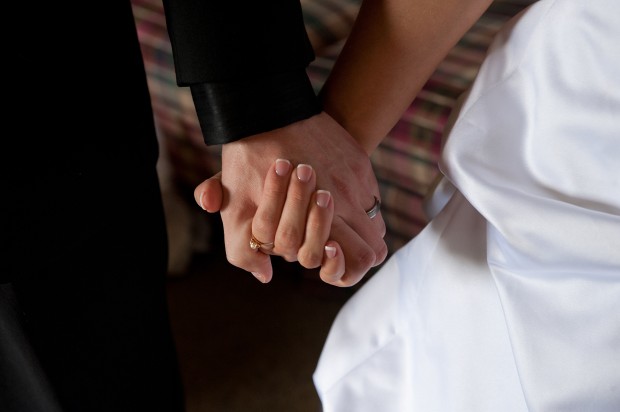WASHINGTON (CNS) — The Supreme Court will take up in the spring two cases over the constitutionality of same-sex marriage.
In orders issued Dec. 7, the court agreed to hear a case over California’s Proposition 8, which bans same-sex marriage, and one out of New York over the federal Defense of Marriage Act, which defines a marriage as being between one man and one woman.
The cases likely will be on the court’s calendar for argument in March, with a ruling before the end of the term in late June.
[hotblock]
After weeks of court-watching when the petitions for review of more than half a dozen cases over the same-sex marriage were on the justices’ list for consideration, the orders Dec. 7 suggested the justices worked at covering multiple bases in what they granted, noted court-watchers at the Supreme Court blog, SCOTUSblog.
The orders focused on two issues: how marriage is defined and whether same-sex couples who are legally married are entitled to the same kind of spousal benefits as heterosexual spouses.
In each case, the court noted that it would first consider whether the parties involved have legal standing, meaning the court could toss out both cases on the basis of who brought the lawsuits and not actually address the underlying constitutional issues at all. If that happened, the court could take up other cases to get to the constitutionality.
The orders also asked the parties in the New York case to first help the justices consider whether the key part of DOMA even holds, because the federal government has said it is not constitutional and has declined to defend it.
DOMA, signed by President Bill Clinton in 1996, was a reaction to Hawaii’s Supreme Court ruling in 1993 that the state had to show a compelling interest to prohibit same-sex marriage, leading to concerns that a subsequent challenge would make the practice legal. DOMA defines marriage as only between one man and one woman for the purposes of the federal government, including for Social Security benefits, federal programs and federal estate and income taxes.
Although subsequent administrations supported DOMA in court, early in 2011, Attorney General Eric Holder announced the agency would no longer defend the law. Holder said that after review of recommendations including his own, President Barack Obama had concluded that DOMA’s definition of marriage as applied to same-sex couples fails to hold up to constitutional scrutiny.
Saying he prayed that the court would uphold the traditional definition of marriage, Archbishop Salvatore J. Cordileone of San Francisco, chairman of the Subcommittee for the Promotion and Defense of Marriage of the U.S. Conference of Catholic Bishops, said the court’s decision to take the cases is a “significant moment for our nation.”
In a Dec. 7 statement, Archbishop Cordileone said traditional marriage between one man and one woman “is as old as humanity” and is the foundation of a just society because it protects children, “the most vulnerable among us.”
Nine states and the District of Columbia allow or will soon begin allowing same-sex marriage. That includes, Maryland, Maine and Washington, which passed laws approving it in November’s election, while Minnesota voters defeated a referendum seeking to ban it. Thirty-one states have constitutional amendments prohibiting same-sex marriage.
Many of the cases the court has been asked to hear revolve around the question of employee or survivor benefits for spouses who married in states where same-sex marriage is permitted. Other challenges relate to bankruptcy, immigration and military benefits.
The cases the court accepted are: Hollingsworth v. Perry, which asks whether the Equal Protection Clause of the 14th Amendment prohibits the State of California from defining marriage as the union of a man and a woman, as Prop. 8 does; and Windsor v. United States, in which a New York woman sued over having to pay $363,000 in federal estate taxes after the death of her wife. If she had been married to a man, she would have been exempt from the taxes.
PREVIOUS: Church urges ‘circle of protection’ for poor in US budget debate
NEXT: If charitable deductions are in peril, will contributions be, too?



Share this story